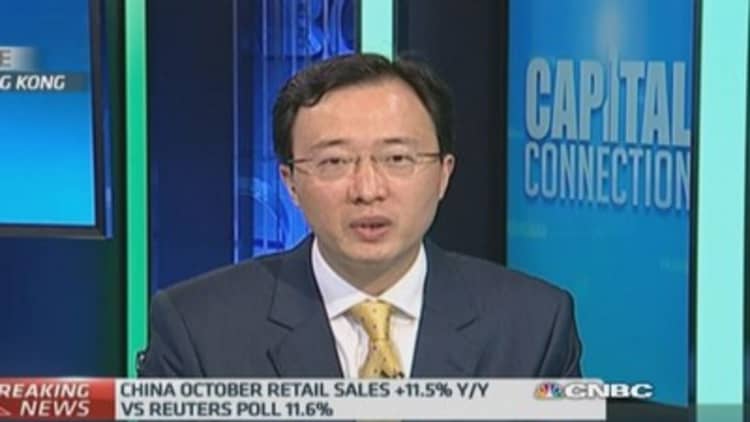
A slew of data out of China on Thursday suggested continued slack in the world's second largest economy, which looks on track to undershoot the government's annual 7.5 percent growth target, say economists.
Chinese industrial production and retail sales data missed expectations in October, extending a trend of below-view indicators amid a backdrop of slowing growth.
Industrial production rose 7.7 percent on year in October, below expectations for an 8 percent increase in a Reuters poll. Meanwhile, retail sales rose 11.5 percent on year, slightly below expectations for an 11.6 percent rise.
Fixed asset investment for the January-October period increased 15.9 percent, in line with expectations.
"The data confirm the domestic side of the economy is quite weak," Alaistair Chan, economist at Moody's Analytics told CNBC, noting that most of the downturn continues to be driven by the housing sector.
A breakdown of the industrial production data shows that businesses linked to the housing market, including cement, iron and glass, are doing poorly, Chan said.
Read MoreChina President: Risks to economy "not that scary"
"We were looking for a small bounce in growth in the fourth quarter but that may not happen anymore, considering the government seems willing to see the slowdown play out without much stimulus," he said.
China's economy slowed to 7.3 percent in the third quarter, its weakest rate since the first quarter of 2009.
Shen Jian Guang, Greater China Chief Economist at Mizuho Securities Asia agrees the property sector remains the main drag on the economy.
Read MoreThis sector is growing at double digits in China
"[It's] the main source of weakening in the economy. That's why the PBoC (People's Bank of China) has injected the money and asked the banks to reduce mortgage rate and support first-time home buyers. I think the strategy is to make the housing market recover and [let it] compensate for the decline in manufacturing and infrastructure investments."
Blame APEC
Other economists say the Asia-Pacific Economic Cooperation (APEC) summit in Beijing, held from November 5-11, is primarily to blame for the softer economic data.
"The APEC summit [had] a negative impact on China's activities as the government took aggressive measures before and during the summit to achieve a blue sky," said Ting Lu, chief China economist at Bank of America Merrill Lynch.
Read More
"These measures involve suspending many industrial and construction activities in and around Beijing," he said.
November will be affected by the APEC summit as well, said Lu, but there will be a rebound in December.
"We expect more easing measures in coming weeks partially in response to the weak data in November, but Beijing won't over-react," he said.

